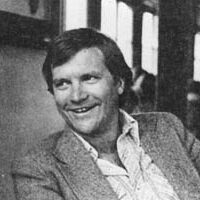Lucian Truscott IV
- 1976

Fellowship Title:
- West Point Class of '69: Attitudes and Experiences
Fellowship Year:
- 1976
Dirty Laundry: West Pointers and Women
March 17, 1977 Girls arrived on the bus. Marijuana, mescaline, acid arrived in manila envelopes or little cardboard boxes in the mail. Booze arrived in the bottom of overnight bags, hidden in dirty underwear and shirts. Weekends always arrived late. There was an equation in the minds of cadets between women and weekends. For their first three years, cadets were not allowed to “escort” except on weekends, and even when you got to be a Firstie, how many guys had girlfriends who lived or went to school near enough to be taken to the Wednesday movie? Besides, as has been reported countless times on the subject of West Point, cadets were not allowed to touch girls in public. This was a regulations violation known as “PDA,” Public Display of Affection, and was punishable, depending on the nature of the display of affection, with hours on the area and months in one’s room in confinement. Touching a woman is basic. I mean it’s right there on the level of breathing and eating. If a woman
West Point Careers: Pages From a Spineless Journal
January 11, 1977 On The Road — We’re picking up momentum now, moving north. It’s coming up on midnight, I see by the digital clock overhead. We scooted through downtown Atlanta on 1-75 without being noticed. Chattanooga is up ahead, then Knoxville — “malfunction junction” they call it — then Cincinnati, the “Queen City.” I guess we’ll stop somewhere north of Knoxville, up in the mountains. It’ll be three or four a.m. by then, time to stop and sleep till check-out. It’s been that way for two weeks now. Behind us a dozen cities are strung out like Christmas tree lights around the edges of this trip. Yeah. That’s the image that comes to mind. We always seem to move in and out of the cities at night, and in the hot summer air, they twinkle through the windshield, each one indistinguishable from the last. I remember ending up on the wrong side of Dallas at six a.m. after 14 hours on the road, coming into Houston in a fog-scattered downpour. I remember this
West Point Careers: Mine
December 3, 1976 New York City — I have this recurring dream, sometimes it’s a nightmare, in which I’m back at West Point, still a cadet. All kinds of weird things are going on, like in a regular dream. Real people and real faces from the past are mixed with an imaginary assortment of people and faces I’ve never seen before. Events swirl in a high speed merry-go-round of anxiety, a spinning place gone out of control, threatening to leave the face of the earth like a giant flying saucer and become a place apart, physically and psychologically. A thousand demands are made. Nothing can get done on time. If I shine my shoes and clean the room and make sure there are name tags on all my T-shirts and don’t study, I’ll flunk the fluids test tomorrow; but if I study and kiss-off all the other stuff, I’ll get written up and lose weekend privileges. Every decision is a dead-end street. Nothing goes right. The whole world is Post Finance, and they’ve lost
West Point Careers: Two Out
October 4, 1976 Denver, Colo. — At this writing, more than 50% of the West Point class of 1969 has resigned from active duty service in the Army. The class had a five year service obligation after graduation, and on June 4, 1974, many resignations which had been filed in advance took effect. Already, some two dozen 1969 graduates had resigned, or had been separated from the Army for political reasons — among them, opposition to the war in Vietnam, and opposition to the regulation which required attendance at Chapel at the Military Academy. The class also had five conscientious objectors, including the first in United States history, and one deserter in Sweden, the only West Pointer known to have deserted the Army. Clearly, 1969 was an extraordinary class. No West Point class has had a greater percentage of resignations, and no class has shown more political activism. Yet, ironically, members of the class of 1969 were in great demand for the choicest assignments in the Army — command positions in combat in Vietnam,
West Point and Honor: What We Haven’t Told You
June 21, 1976 New Orleans, La. – I have come to this sweat-stained city on the Gulf Coast to interview a classmate, and to think about the honor scandal which over the past two months has cracked the granite upon which rests the United States Military Academy. Somehow the two mesh comfortably for me, the heat, a ground-fog of steam on Ursulines Street, below my wrought iron balcony in the French Quarter, and the idea of confronting that which we were taught was never to be questioned, the honor code, the “conscience of the Army,” generals keep calling it in interviews on TV and in the newspapers. I feel at home here in my dinky room in the French Quarter. It’s about the size of the room I had at West Point when I first arrived in June of 1965. For some reason, the heat feels good. I guess on a basic level I equate sweat with work, not a revolutionary notion, but one which has its parallels with the story I’m about to
